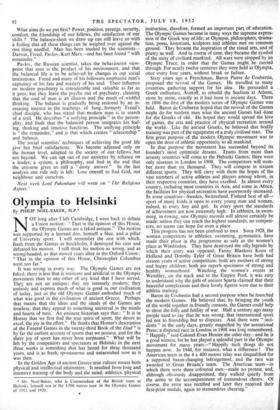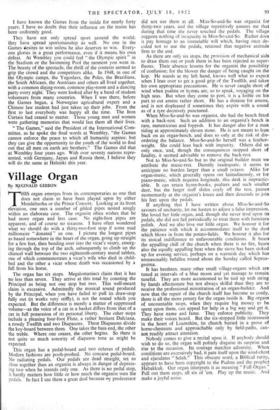Olympia to Helsinki
By PHILIP NOEL-BAKER, M.P.*
NOT long after I left Cambridge, I went back to debate a Union motion : "That in the opinion of this House, the Olympic Games are a faked antique." The motion was supported by a learned don, himself a blue, and a pillar of University spoil I well remember the zest with which, fresh from the Games at Stockholm, I destroyed his case and defeated his motion. I still think his motion as wrong, and as wrong-headed, as that moved years after in the Oxford Union: "That in the opinion of this House, Christopher Columbus went too far."
It was wrong in every way. The Olympic Games are not faked; there is less that is insincere and artificial in the Olympic movement than in any other of any kind that I have served. They are not an antique; they are intensely modern; they embody and express much of what is good in our civilisation of today, just as the old Olympic Games embodied much of what was good in the civilisation of ancient Greece. Perhaps that means that the ideas and the ideals of the Games are timeless; that they appeal to something universal in the minds and hearts of men. An eminent historian says that: "It is in Homer that we first find the true spirit of sport, the desire to excel, the joy in the effort." He thinks that Homer's description of the Funeral Games in the twenty-third Book of the Iliad "is by far the earliest account of sports that we possess, and for the sheer joy of sport has never been surpassed." What will be felt by the competitors and spectators at Helsinki in the next three weeks is something that has lasted for three thousand years, and is as fresh, spontaneous and untarnished now as it was then.
In the Golden Age of ancient Greece true culture meant both physical and intellectual-attainment. It resulted from long and intensive training of the body and the mind; athletics, physical
* Mr. Noel-Baker, who is Commandant of the British team at Helsinki, himself ran in the 1,500 metres race in the Olympic Games of 1912 and 1920.
instruction, therefore, formed an important part of education. The Olympic Games became in many ways the supreme expres- sion of the Greek way of life; at Olympia, philosophers, drama- tists, poets, historians, sculptors and athletes met on common ground. They became the inspiration of the visual arts, and of poetry as well. And in course of time, they became the symbol of the unity of civilised mankind. All wars were stopped by an Olympic Truce, in order that the Games might be carried through. For nearly twelve centuries they were held at Olympia, once every four years, without break or failure.
Sixty years ago a Frenchman, Baron Pierre de Coubertin, proposed the revival of the Games. He travelled to many countries, gathering support for his idea. He persuaded a Greek enthusiast, Averoff, to rebuild the Stadium at Athens, stone by stone, exactly as it had been in ancient days. There in 1896 the first of the modern series of Olympic Games was held. Baron de Coubertin hoped that the revival of the Games might do for modern man what the ancient Games had done for the Greeks of old. He hoped they would spread the love 'of games, the arts and practice of physical recreation around the world. Like the ancient Greeks, he believed that bodily training was part of the equipment of a truly civilised man. The first great purpose of the modern Olympic movement was to open the door of athletic opportunity to all mankind.
In that purpose the movement has succeeded beyond its founder's most optimistic dreams. Teams from more than seventy countries will come to the Helsinki Games; there were only nineteen in London in 1908. The competitors will num- ber more than six thousand. They will compete in sixteen different sports. They -Will carry with them the hopes of the vast numbers of active athletes and players among whom, in their respective countries, they have excelled. In almost every country, including most countries in Asia, and some in Africa, the facilities for physical recreation have enormously increased. In some countries—Sweden, Switzerland, Finland best of all— sport of many kinds is open to every young man and woman, indeed, to every boy and girl. In every sport the standards of achievement are now extremely high. In athletics, in swim- ming, in rowing, new Olympic records will almost certainly be made; unless they can reach the highest standards, no competi- tors, no teams can hope for even a place.
This progress has not been confined to men. Since 1928, the women competitors in athletics, swimming, gymnastics, have made their place in the programme as safe as the women's place at Wimbledon. They have destroyed the silly legends by which their entry was opposed; Fanny Blankers Koen of Holland and Dorothy Tyler of Great Britain have both had sixteen years of active competition; both are mothers of strong and happy children; both are superb specimens of strong and healthy womanhood. Watching the women's events at Wembley, on the track and in the Empire Pool, it was easy to understand why the girls of ancient Sparta claimed that their beautiful complexions and their lovely figures were due to their athletic training.
Baron de Coubertin had a second purpose when he launched the modern Games. He believed that, by bringing the youth of the world together in friendly contests, the Games could help to show the folly and futility of war. Half a century ago many people used to say that he was wrong, that international sport led not to friendship but to disputes. And there were " inci- dents" in the early days, greatly magnified by the sensational Press; a disputed race in London in 1908 was long remembered. "Happily," said Colonel Evan Hunter the other day—and he is a good witness, for he has played a splendid part in the Olympic movement for many years—" Happily such things do not happen now. In 1948, for instance, what a difference ! The American team in the 4 x 400 metres relay was disqualified for a supposed baton-changing infringement, and the race was awarded to Great Britain's team. The American team—in which there were three coloured men—made no protest, and, although obviously disappointed, they walked quietly from the arena to the accompaniment of tremendous cheers. Of course, the error was rectified and later they received their first-prize medals, again to tremendous cheering." I have known the Games from the inside for nearly forty years; I have no doubt that their influence on the teams has been uniformly good.
They have not only spread •sport around the world; they have spread spOrtsmanship as well. No one in the Games desires to win unless he also deserves to win. Every- one glories in a great performance, even if it means his own defeat. At Wembley you could feel "the Olympic spirit" in the Stadium or the Swimming Pool the moment you went in. The beauty of the spectacle, the thrill of the contests seemed to grip the crowd and the competitors alike. In 1948, in one of the Olympic camps, the Yugoslays, the Poles, the Brazilians, the South Africans, the Austrians and others all lived together, with a common dining-room, common play-room and a dancing party every night. They were looked after by a band of student volunteers from many countries. When I was there, before the Games began, a Norwegian agricultural expert and a Chinese law student had just taken up their jobs. From the first to last everybody was happy all the time. The Iron Curtain had ceased to matter. Those young men and women were gathering memories that would last them all their lives.
"The Games," said the President of the International Com- mittee, as he spoke the final words at Wembley, "the Games cannot enforce the peace to which all humanity aspires; but they can give the opportunity to the youth of the world to find out that all men on earth are brothers." The Games did that at Wembley four years ago. With over seventy nations repre- sented, with Germany, Japan and Russia there, I believe they will do the same at Helsinki this year.



































 Previous page
Previous page